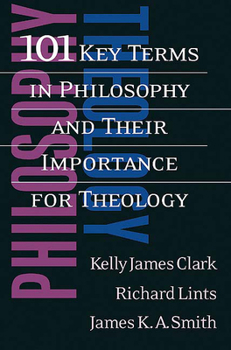101 Key Terms in Philosophy and Their Importance for Theology
Select Format
Select Condition 
Book Overview
Written by two philosophers and a theologian, this book provides easy access to key terms in philosophy and how they are understood and used in theology. The focused entries discuss what the terms have meant in classical and contemporary philosophy and then shift to what these philosophical understandings have meant in the history of Christian theology to the present day. The result is a unique volume that clearly shows the interplay of these disciplines...
Format:Paperback
Language:English
ISBN:0664225241
ISBN13:9780664225247
Release Date:July 2004
Publisher:Westminster John Knox Press
Length:128 Pages
Weight:0.58 lbs.
Dimensions:0.6" x 5.9" x 8.9"
Customer Reviews
3 ratings
Perfect
Published by Thriftbooks.com User , 14 years ago
For at least a year and a half I've been looking for such a reference and have during that time come across a few dudes. This book is exactly what I've hoped for. I have some knowledge in the natural theology field. I have found that the explanatory articles are thorough without a great deal of distracting detail. Every undergraduate college that offers courses in either philosophy or theology should have this book at the reference area of it's library.
A wonderful frame of basic philosophical terms relevant to theology
Published by Thriftbooks.com User , 18 years ago
This book is a useful resource and a reference work. The book is a compendium of 101 philosophical terms that are of particular relevance for anyone who is interested in theology. It is probably not the most comprehensive list of those terms, but all the references are very well written and intelligible. I think it will be particularly useful to people who study and read theological works on their own. Even in the age of Internet and easy access to information, it is still good to have all the terms covered in a single accessible book.
A very useful guide...
Published by Thriftbooks.com User , 20 years ago
I have been teaching in introduction to theology and systematic theology course for the past half decade, and if there is one deficit that I find fairly common among the students, it is a lack of knowledge about philosophy. Once upon a time, a young man going to seminary would have a background in liberal arts with a thorough grounding in the basics of philosophy - things have changed! Many seminary students are second-career, having had business or career-oriented educations, and every little philosophy along the way. This text is a very welcome resource for those students, as well as students who do have a background in philosophy, as a ready reference. This is a book of philosophy terms - specifically theological terms are not covered save insofar as they are direct cross-over terms to theology. There are entries for key philosophers (Descartes, Heidegger, Hume, etc.) and key philosophical topics (ethics, metaphysics, etc.), as well as philosophical schools. Natural theology is covered - this was a topic in philosophy; hermeneutics is a cross-over term that gets dealt with in different ways. One might quibble with some of the choices here, but for 101 topics in 100 pages, there will necessarily be omissions -- being interested in hermeneutics and Paul Ricoeur, I was sorry to not see Ricoeur's name in the book, mentioned in the topic, or referenced in the back; similarly, having a major entry for Feuerbach but no entry for Kant might be something I would change. However, these are minor concerns that those with more philosophical education would express; from the standpoint of the student and new learner, these are not major problems by any means. There is a cross-reference index at the back that is handy; similarly, terms throughout the dictionary are marked with asterisks to indicate major entries, and related entries are listed at the bottom of most definitions. This book stands in the line between a dictionary and an encyclopedia of terms; more substantial than dictionary entries generally, they stop short of being complete essays on the topics. The bibliographic references are a wonderful guide to further reading and research, which helps the reader go beyond this text. The authors, teaching at Calvin College and Gordon-Conwell Seminary, take a broadly ecumenical and objective approach to the terms, so this will be of use to students and readers Catholic, Orthodox or Protestant.





